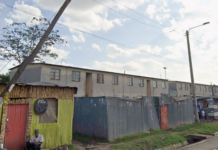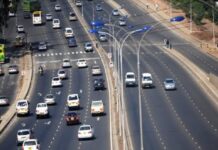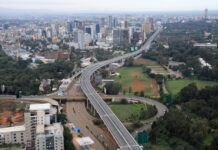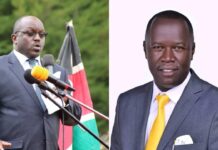When the Kenya National Highways Authority (Kenha) began erecting road beacons in Murang’a county, some plot owners discovered that the prime 40 by 100 foot plots they had purchased were actually road reserves.
Mr James Njogu, 73, found that the plot he purchased near Maragua town on the Kenol-Murang’a road now measures 40 by 10 feet.
“I bought the plot in 2014 with the intention of building a small entertainment joint using my retirement benefits from teaching,” he said.
He bought the plot through a broker at Sh700,000.
“By 2017, I started receiving offers to sell it at an asking price of Sh1.5 million. But a government surveyor from Murang’a county tipped me that the road would be made a dual carriageway in 2022, and I stood a good chance to make a lot more money,” he said.
The surveyor allegedly told him that the government would buy the plot for Sh2 million if he built a cheap structure on it.
“I built a 10 by 10 feet room and went home to relax waiting for the windfall. It is now a nightmare, where the Kenha beacons have been erected deep into my plot, leaving me with a 40 by 10 feet plot with a market value of about Sh100,000,” he said.
Mr Martin Mbithi and Ms Scolastica Koki jointly bought four plots near Kenol town on the Kenol-Sagana road in 2012 for Sh2 million.
“The four plots measure 210 by 100 feet and we had in mind speculating and selling them off for a profit. But Kenha has now dealt us a blow after its beacons left us with a strip measuring 210 by less than 10 feet,” Ms Koki said.
Mr Mbithi said they were issued with title deeds “but the big trouble is that titling is under the principle of sale agreement that committed us to have acquired the holding where it was, as it was”.
That means they committed to any future outcome and accrued liabilities of the sale, he explained.
The beaconing was made necessary by illegal encroachments on road reserves, according to Kenha Director General Kung’u Ndung’u.
“In most cases, the maps indicating where private land starts are there, but people refuse to exercise diligence in land deals, ending up eating into our space,” he said when he led a government delegation to inspect the building of the Kenol-Sagana-Marua highway.
“There are the genuine property owners who will be compensated after we ate into their lands, but there are those who had initially encroached on us and they will bear own vacation costs,” added Mr Ndung’u.
Some brokers involved in the transactions have stated that they had no intention of shortchanging their clients, but that after conducting land searches and obtaining the services of government surveyors, they were cleared to transact.
“We are sorry, but that is the nature of this sector, where poor government planning and a lack of record integrity has been the source of corrupt real estate deals,” said one of the brokers who did not reveal his name for fear of incriminating himself in fraud.
He claimed that some of the suspect deals now being investigated as cases of fraud are the result of collusion between government officials in the administration and land departments.
“Titling a road reserve can only be done by government itself and that tells you who is who in these cases of fraud,” he said.
Murang’a South Deputy County Commissioner Gitonga Murungi told Nation.Africa: “Land fraud remains one of our major challenges whereby even public utility lands have been sold off.”
He said there are “absurd cases of even a public dam being in the name of a private developer and spaces meant for health centres, markets and schools being in the hands of the corrupt grabbers”.
The beaconing of road reserves is a good idea because it will eliminate cases of unsuspecting realtors being duped into fraudulent land transactions.
He stated that the government is betting on the ongoing development of the National Land Information Management System (NLIMS), which is expected to be fully operational by 2024, when it aims to have realised a comprehensive online database.
“We are optimistic that the move will induce certainty of land ownership, security of tenure, reduction of land disputes, enhanced revenue collection and improved land conveyancing,” he said.
Further, the government will have it easy ascertaining the tax potentials, determine litigations faster as well as keep grabbers off public utility lands.
“This is because we are now building the most accurate land data in the country and integrating it with other public sector authorities such as Judiciary, financial institutions, investigative and integrity agencies as well as the taxman,” he said.
According to the Town and County Planners Association of Kenya (TCPAK), the government should also build a land bank that will map out all public lands to avoid shady deals.
TCPAK chairman Mairura Omwenga stated that the country loses more than Sh20 billion per year due to land sector confusion and corruption.
“This is the estimated loss that the fraud has denied individual and families as heritage, the cost of litigations in courts, lost opportunities in utilisation of the lands grabbed as collateral to access growth credit and denied trade,” Mr Omwenga told Nation.Africa.



















